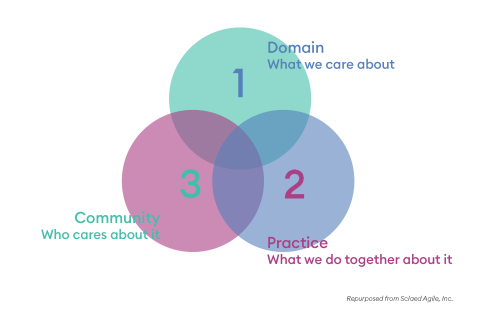Team Collaboration Begins with a Community of Practice
Getting good people just to talk to each other within an enterprise is a difficult and common problem. We all know that retaining knowledge within an organisation is critical to its well being and for any given problem there are only a few people that can solve it, given the opportunity.
One of the crunch points in transforming an organisation is encouraging the right types of open communication. Directing healthy conversation sounds a bit prescriptive; the idea is to set up the conditions and then let people go. A Community of Practice (CoP) is a solution geared towards the problem of getting to good practice locked inside departmental silos and exposing it for others to see and use. Something that we use every day like email is part of the problem here, which requires a superior electronic or digital forum to be used in its stead. No one wants to see a massive email chain passed around, with the corresponding comment that the answer is "in there, somewhere" or "please see below".
The trick with a CoP is starting it. If it gets off the ground it quickly becomes something so obvious that no one can remember it not being there. The right reason to start one is that you can see that something has become an enterprise-wide blocker. Maybe people are starting to route around the problem or just avoid certain types of work altogether. Some issues are never quite under one group's purview, allowing the problem area to drift like an uninvited ghost. The issues that normally cause technical problems are when existing internal systems clash with attempts to use current tools. The blocker might be layers of security that stop standard channels or ports or layers of bureaucracy that render simple solutions unworkable. What is often required is to combine two different types of knowledge - the understanding of the intents of the organisation and why a new tool or system will render value.
Effectively then, a CoP is just a place where a bunch of technical people can talk about one area or issue with a similar audience. They will usually be issues where the organisation's environment puts a 'special' spin on things. The subject, or domain, might be ordering and using internal servers or interfacing with in-house deployments of standard development tools like Jenkins, or Git. I remember working on one based on the internal adoption of Ansible, for example. The conversations will lean on the trials and tribulations i.e. the practice of either using software, which may not reflect the corporate view. Because of the internal dimension, just using stackoverflow.com will not quite work.
The community becomes entirely self-selecting, which is why after it starts it should self-reinforce. Initially, reaching into other teams across line or product boundaries will take some time and persuasion, until the value becomes evident.

As a CoP encourages open communication, they usually go hand in hand with a wiki. You will certainly need to host the community on something visible to all on the web. Even if you start with a modest IRC channel, you need a place to lay the ground rules. Slack isn't quite right because there is no "Start Here" for a new joiner to find things. Many members will want to dip into a sane looking post, not jump into a conversational snake pit. A good wiki, like Atlassian's Confluence, has ways to comment on articles and edit them, as well as places to simply ask questions.
The normal pattern is to start with a few articles that discuss a problem and pass links to these articles to those who are interested. Others can then add to the conversation or refine the solution. People new to the problem can be directed to articles on the basics, as well as to other people in the same situation as themselves. As things change, the original articles can be updated and new information can be offered. Sometimes a template will emerge that can solve a similar issue elsewhere within the organisation.
Like any community, you must inject enthusiasm and purpose, prune and water. Naturally, a few leaders will emerge and be cognisant they might want their leadership to be reflected in their performance review. Don't be surprised if a CoP becomes a generic lever for change but this is partly the point. Transformations are really about driving change from within and understanding how to steer.
If you would like to know more about how your organisation can benefit from Communities of Practice, please contact us.

